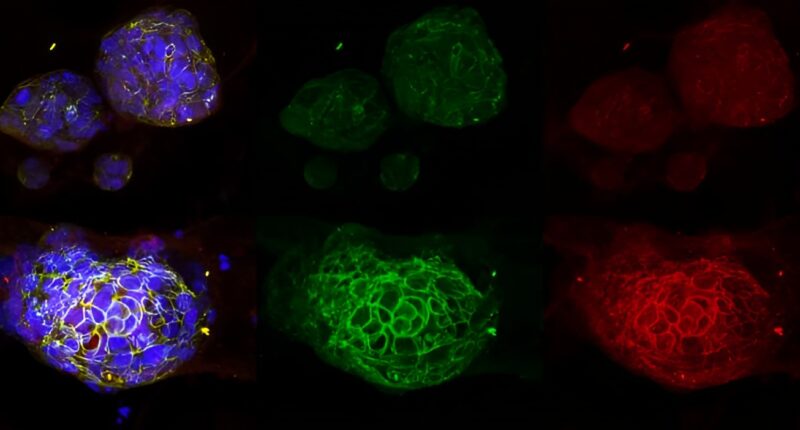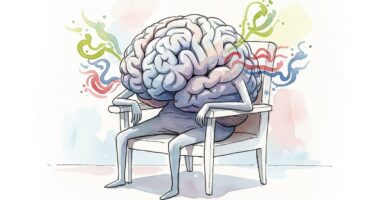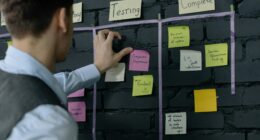University of California San Diego scientists have developed an AI-powered approach that reprograms cancer stem cells to self-destruct, demonstrating potential to reduce the risk of recurrence and death in colon cancer by up to 50 per cent in computer simulations across more than 2,100 patients.
The research team built a machine learning tool called CANDiT (Cancer Associated Nodes for Differentiation Targeting) that identifies treatment targets based on a tumour’s unique genetics. The approach, published in Cell Reports Medicine, targets elusive cancer stem cells that help cancers spread, return after treatment and resist therapy.
Pradipta Ghosh, senior author and professor of medicine and cellular & molecular medicine at UC San Diego School of Medicine, explained the challenge these cells present. “Cancer stem cells are like shapeshifters,” he said. “They play hide-and-seek inside tumours. Just when you think you’ve spotted them, they disappear or change their identity. It’s like trying to hold on to a wet bar of soap in the shower.”
CANDiT works by starting with a single key gene that healthy cells need to grow but that is missing in aggressive cancers. The tool then identifies a network of related genes, suggesting treatment targets that can leverage this biochemical network to revert cells to a healthier state.
Entire human genome scanned
Using CDX2, a significant gene in colon cancer, researchers deployed CANDiT to scan the entire human genome across more than 4,600 unique human tumours, reflecting genetic diversity typical of large, multi-centre clinical trials. The approach identified an unexpected treatment target: a protein called PRKAB1, which helps cells respond to stress.
By using an existing drug that activates this protein, researchers restored the function of the CDX2 gene in colon cancer stem cells. The reprogrammed cells began behaving like normal healthy cells before spontaneously self-destructing.
Saptarshi Sinha, first author and interim director of the Centre for Precision Computational Systems Network at UC San Diego School of Medicine, said the outcome surprised the team. “What surprised us most was that after we reprogrammed the cancer stem cells to behave like normal cells, they chose to self-destruct instead,” he said. “It was as if they couldn’t live without their cancerous identity.”
The researchers successfully tested the drug in patient-derived organoids, tiny laboratory-grown replicas of human tumours that preserve the structure, behaviour and biology of real cancers. These organoids enable researchers to test treatments in human tissues, streamlining the process of bringing therapies to clinical trials.
Ghosh, who directs UC San Diego’s HUMANOID Centre, said organoid testing accelerates development timelines. “It’s like doing clinical trials in a dish, which collapses timelines from years to months,” he said. “We used a complete suite of cell analysis platforms at the Agilent Center of Excellence to measure not just whether a drug works, but how precisely and safely it works, before it ever reaches a patient.”
The team developed a gene signature that predicts how well patients might respond to the therapy. Using computer simulations across 10 independent patient groups totalling more than 2,100 people, mirroring Phase 3 clinical trial diversity, they found that using the drug to restore CDX2 in colon cancers could cut the risk of recurrence and death by up to 50 per cent.
The “Holy Grail of cancer”
Sinha said the breakthrough addresses a longstanding challenge in cancer treatment. “For decades, the Holy Grail of cancer has been its stem cells — resilient, elusive and beyond our ability to identify or track them,” he said. “They are able to outsmart every form of treatment, even the most advanced immunotherapies. To be able to track and selectively kill them brings us closer to rewriting the rules of cancer treatment.”
The researchers are collaborating with UC San Diego chemistry professor Jerry Yang, who has designed a more potent version of the compound with the goal of advancing it into clinical trials, and professor of surgery Michael Bouvet, who is leading efforts to deploy CANDiT across multiple tumour types including pancreatic, oesophageal, gastric and biliary cancers.
Ghosh said the approach extends beyond colon cancer. “CANDiT is an end-to-end human roadmap — we can apply it to any tumour, find the right targets, and finally take aim at the cells that have been the hardest to define, track or treat,” he said. “By constantly anchoring small-scale organoid insights to Phase 3–sized human diversity in the clinic, we can build discoveries that are rigorous, reproducible and scalable, all without losing sight of the essentials of human disease. The potential of this approach to transform clinical medicine is not just immense — it’s inevitable.”
The study was supported by the National Institutes of Health and UC San Diego’s Institute for Network Medicine.











